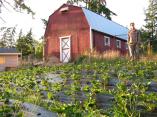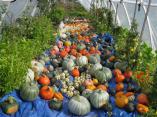I love the random and unusual places my food interests take me. But then, as we learned at food school, gastronomy touches every aspect of life; and food being life-giving, its universal reach should not surprise us.
So last week I returned from beautiful Bellingham and stopped briefly in vivacious Vancouver, where I was whistled off for a delectable Palestinian lunch at Tamam on East Hastings. All the food is made from scratch, and tastes fresh and
(rice & lentils with caramelized onion) with a lemony red cabbage salad, some house-made flatbread with za’atar and another with yogurt, followed by the very pretty kunafah dessert – spun pastry enfolding a couple of different kinds of cheese. I took away an order of Palestinian cabbage rolls (the cabbage is fermented, and stuffed with rice and vegetables) with a side of green salad, fuel for the ferry ride home. And it was a welcome respite from the indignities of BC Ferries’ franchised fast food offerings.
We stopped in at the Woodland Smokehouse & Commissary after that, and emerged with assorted house-smoked sausages, a salad of potato, bacon and mushrooms, and a long and wistful memory of the freezer cabinet and its load of Earnest Ice Cream, which is sold in reusable glass jars.
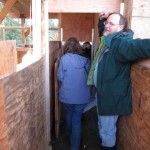 Once home I unpacked and readied myself for a trip to Salt Spring Island, where the CRFAIR roundtable meeting was treated to a tour of the newly/nearly finished community abattoir. Our guide and president of the abattoir society, Jean Brouard, made clear he was not the only vegetarian on the committee, and added that there were several vegans aboard as well.
Once home I unpacked and readied myself for a trip to Salt Spring Island, where the CRFAIR roundtable meeting was treated to a tour of the newly/nearly finished community abattoir. Our guide and president of the abattoir society, Jean Brouard, made clear he was not the only vegetarian on the committee, and added that there were several vegans aboard as well.
After all, he told us, the foremost aim of this facility was to improve animal welfare. The 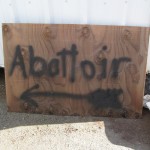 draconian changes to farmgate meat processing several years ago had made it illegal for farmers to slaughter their own animals. Aimed at making large scale meat processing safer, the changes were devastating to small farm operations, particularly ones in remote locations. The financial and logistical repercussions of taking a small flock of chickens or a couple of lambs on the ferry for slaughter meant that meat production on Salt Spring dropped by nearly 50%. Local farmers and food activists were worried by the island’s corresponding drop in food security: having to import so much of the island’s protein put them at the mercy of steadily increasing ferry fares and put the few animals under production under considerable stress. Fundraising ensued and the island put plans together to build Canada’s first dual (red and white meat) abattoir.
draconian changes to farmgate meat processing several years ago had made it illegal for farmers to slaughter their own animals. Aimed at making large scale meat processing safer, the changes were devastating to small farm operations, particularly ones in remote locations. The financial and logistical repercussions of taking a small flock of chickens or a couple of lambs on the ferry for slaughter meant that meat production on Salt Spring dropped by nearly 50%. Local farmers and food activists were worried by the island’s corresponding drop in food security: having to import so much of the island’s protein put them at the mercy of steadily increasing ferry fares and put the few animals under production under considerable stress. Fundraising ensued and the island put plans together to build Canada’s first dual (red and white meat) abattoir.
The community decided it wanted the facility to be a mobile abattoir, to share services with nearby Pender Island, and raised enough money in cash and grants to start building in January last year. Unfortunately, in the process of meeting the multiple and often contradictory requirements of the regulating agencies (municipal and provincial health authorities, CCDC and CFIA as well as building standards) the mobility dropped out of the picture. So did the first building inspector they’d worked with and his successor deemed it necessary that the building meet stringent seismic standards, adding nearly a third again to the not inconsiderable building costs. A new round of fundraising will soon begin to clear the debts incurred. The abattoir opened for bird business in late September, just in time for Canadian thanksgiving, and recently processed its first lambs. Adjustments and adaptations were in progress with carpenters and electricians fine-tuning reinforced boards and the new chiller equipment.
The abattoir is, like all those large and small, subject to rigorous inspection, with every 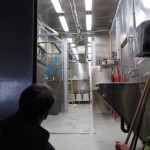 animal checked by a federal meat inspector. It’s anyone’s guess what will happen if the federal government makes good on its promise to hand inspection over to the provinces – a move slowed by the recent Excel Meats disaster in Alberta, which showed that even the current system is fatally flawed.
animal checked by a federal meat inspector. It’s anyone’s guess what will happen if the federal government makes good on its promise to hand inspection over to the provinces – a move slowed by the recent Excel Meats disaster in Alberta, which showed that even the current system is fatally flawed.




